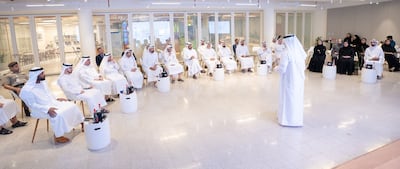The Dubai International Financial Centre will establish an artificial intelligence and Web 3.0 centre with a goal of attracting more than 500 high-tech companies by 2028 as the UAE expands its knowledge economy and seeks to boost its technology sector.
The Dubai AI & Web 3.0 Campus will be the largest cluster of such companies in the Middle East and North Africa region, the Dubai Government Media Office said on Monday.
This initiative is designed to bring in $300 million in funds and create more than 3,000 jobs in the next five years.
“AI is expected to inject Dh103 billion [$28.04 billion] into the UAE economy by 2035 and contribute 14 per cent to the country’s GDP [gross domestic product] by the end of the decade,” Essa Kazim, DIFC's governor, said.
“The Dubai AI & Web 3.0 Campus will significantly contribute to this growth as a global nexus for R & [research and development], investment and innovation.”
Web3 is the emerging third generation of the World Wide Web, with blockchain, decentralisation, openness and greater user utility among its core components.
Spread across 100,000 square feet, the campus will be located at the DIFC Innovation One premises.
It will focus on the use of AI and Web 3.0 in the financial services industry and support DIFC's 2030 strategy, the statement said.
DIFC’s 2030 strategy is centred on driving the future of finance through technology, innovation and partnerships.
FinTech and innovation is the fastest growing sector in the DIFC with 686 associated firms, which raised more than $615 million last year.
Since the onset of Covid-19, people have turned to online banking services and other contactless technology to transfer money and pay for e-commerce transactions.
The industry is expected to double in size to about $270 billion in 2027, from more than $135 billion in 2021, in the wider Middle East, Africa and South Asia region, according to the DIFC FinTech Hive 2022 report.
Globally, digital payments are expected to grow to $8.26 trillion by 2024, from $4.4 trillion in 2020, according to Statista's data.
The Dubai AI & Web 3.0 Campus will be home to entrepreneurs, disrupters and engineers who are working in the fields of emerging technologies, the statement said.
It will offer physical and digital infrastructure including R&D facilities, accelerator programmes and collaborative workspaces, to attract, build and scale AI companies.
The new campus will act as a “catalyst for growth by attracting global innovators, start-ups, venture capitalists, and industry leaders”, Arif Amiri, chief executive of DIFC Authority, said.
“By nurturing a collaborative environment, the Dubai AI & Web 3.0 Campus will accelerate the development of future-forward technologies and empower organisations to unlock the true potential of AI and Web 3.0.”
Dubai is taking several steps to boost the use of new technologies such as AI and Web 3.0, especially in the public sector.
Special task forces within 30 government entities in Dubai have been formed to use AI to transform operations and services, the media office said on Tuesday.

This announcement came at the first meeting convened by the Dubai Centre for Artificial Intelligence, which was recently inaugurated by Sheikh Hamdan bin Mohammed, Crown Prince of Dubai and chairman of the Executive Council and the Dubai Future Foundation.
The task forces will play a “pivotal role in supporting the implementation of various initiatives and projects launched by the DCAI, ensuring collaboration and knowledge-sharing between the entities, as well as co-operation with local and global partners in the private sector”, the statement said.
The teams will include AI-skilled national talent from different government entities in Dubai.
They will study ideas and projects that government entities will develop in co-operation with the centre, Saeed Al Falasi, director of DCAI, said.
“They will also explore flexible and appropriate regulatory frameworks and policies for the uses of AI in the government sector in line with current and future needs,” said Mr Al Falasi.


